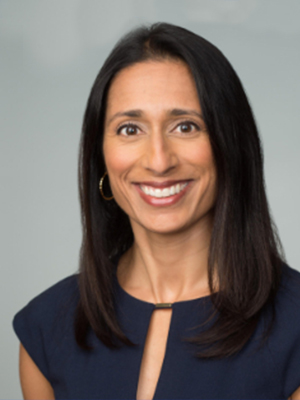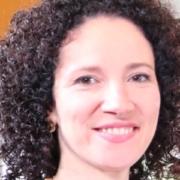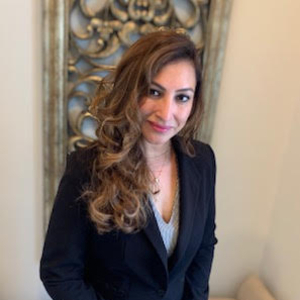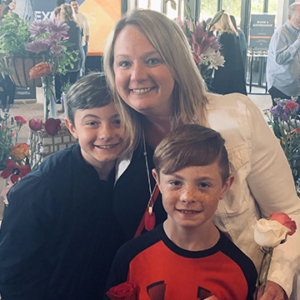Sheetal Prasad, CFA: Managing Director, Jennison Associates
 “I think the constant in my life is that you’re moving to the next level. You’re moving to a new challenge,” says Sheetal Prasad, Small Cap Core and Mid Cap Growth Portfolio Manager at Jennison Associates, “And even though you might not think that you’re ready, you are.”
“I think the constant in my life is that you’re moving to the next level. You’re moving to a new challenge,” says Sheetal Prasad, Small Cap Core and Mid Cap Growth Portfolio Manager at Jennison Associates, “And even though you might not think that you’re ready, you are.”
Prasad talks about the continuous learning curve, the value of culture, diversity of thought and being your whole self at work.
From Pre-Med to Portfolio Manager
Like a “good Indian girl”, Prasad began pre-med at Georgetown. When she realized being a doctor was not her calling, she switched to business. At first, she remained in the healthcare territory, working in a market research firm before moving to Wall Street.
A few years in, she leapt from the sell-side research to buy-side investment management, and then landed at Jennison, thirteen years ago. Soon she was challenged to diversify her expertise.
“I got the opportunity to become a small-cap portfolio manager, but you have to know stocks across the entire universe – not just healthcare, but tech stocks and consumer stocks and industrial stocks,” says Prasad. “The truth is I didn’t have the background for that, but you’re given an opportunity, and you take it.”
Today, most of her time is spent on mid-cap portfolio management.
“I had to learn to love to read. It’s so critical. My job is predicting the future to some degree. It’s finding those companies that are so well-positioned in certain industries that they can continue to grow from being a smaller market value to larger over time,” says Prasad. “The way you do that is by constantly reading or listening and continuing to learn. Learning is the best part of my job everyday.”
How I Built This, Invest Like The Best, The Knowledge Project and Masters of Scale are among podcasts that inform her professionally.
Culture & Social Responsibility Matter More Now
“It’s pretty clear that we aren’t going back to the old normal, so what is that ‘new normal’?” asks Prasad. “How are we going to work – and play – differently? How will life change? Who are the companies that will enable that change and are going to be able to thrive?”
In addition to new companies and business models, Prasad is paying attention to company culture. The post-pandemic world has brought out the true value of culture.
“I have a much greater appreciation for culture today in my investment portfolios and the companies that I invest in,” she says. “Because I think that really is the difference between a company that can grow to be bigger, versus a company that might not make it.”
Investing responsibly is paramount to Prasad, such as considering environmental, social and governance (ESG) criteria.
“As our portfolio companies are becoming more social stewards, we also have to follow that,” states Prasad. “If I don’t feel good about investing in a company, I don’t have to do it.”
“I take my fiduciary and social responsibilities very seriously. It’s the way the investment business is going to be going forward, and we have to be good at it,” she says. “Part of who I am is having a social responsibility to my family, my community, but also to my job and my investors.“
Diversity of Thought And Voices
“In our business, diversity is not just on the outside, but it’s really about diversity of thought,” notes Prasad. “If we all think the same way, we’re not going to do well in a stock market, where we need to be prepared for low probability events and be willing to react.”
Diversity of thought is essential to preventing blindspots, cognitive dissonance and ‘thesis creep’, since her team’s success requires staying open-minded to ‘what ifs’ and the healthy friction of debate.
A candidate that questions a stock the firm holds, from a genuine and informed place, is an asset.
“Everybody is absolutely respectful, but you can’t be shy,” says Prasad. “We don’t hire wallflowers. We want people to express their opinions, because an exchange of ideas is critical to performance.”
Be Visible And Ask Questions
“The financial services industry is behind in their ability to attract and retain and promote women,” states Prasad, though Jennison does better. “And it’s both a top-down problem and a bottom-up problem.”
While face-time is essential to building culture and relationship, she feels the post-pandemic disruption has revealed it’s possible to work more virtually. This could help to attract women and diversity of thought.
Prasad encourages women to sit visibly at the table, not the periphery, and express their opinions. If there’s one thing she wishes she’d known earlier, it is to not be afraid to ask “dumb questions”. Be communicative and ask questions, especially when you shift between roles or jobs.
“I’m asking dumb questions all the time,” she says. “Chances are there’s somebody else sitting at the table that also doesn’t understand.”
She encourages women to take a page from men’s confidence book, and when opportunity presents, take the leap before you think you are ready – knowing you will figure it out, and it’s okay also to fail sometimes.
“I’ve long come to realize that I have to be comfortable with being uncomfortable,” she states. “I’ve had imposter syndrome throughout my entire career. I’ve had to use that discomfort to get smarter, to get better, and to drive towards better performance. It doesn’t stop.”
Being Your Whole Self
Prasad begins her days with yoga before logging on, and recommends to take the time to do whatever helps clear your mind and support your well-being, as often as possible. She is finding working at home is also allowing her to feel more present at work.
“I think very often in life you can’t be really good at your job if you feel as though you’re not giving 100% to your personal life, because that really is the core of who you are. My children, my family, are so important to me,” she says. ”The fact that I can be here for my family allows me to give just as much energy to my job.”
Prasad has learned the value of bringing her authentic self, including her emotions and extroversion, that complements some of her colleagues, to her work.
“In my early career, I was stoic. I felt like it’s all about the job,” she recalls. “Over time, I came to realize it’s okay to care. It’s okay to share. I am going to be emotional about this job and it’s okay. Because the best part of a job really is the people and the relationships you develop.”
“I love my team so much that I think it’s okay for me to show that I’m a woman, that I’ve got family obligations, that I laugh or I cry, or show what bothers me.” She exhales. “Chances are someone else might be going through something similar, and if you can share, they feel like they can. That’s where the team dynamic really comes through. Those small personal interactions go a long way.”
By Aimee Hansen









